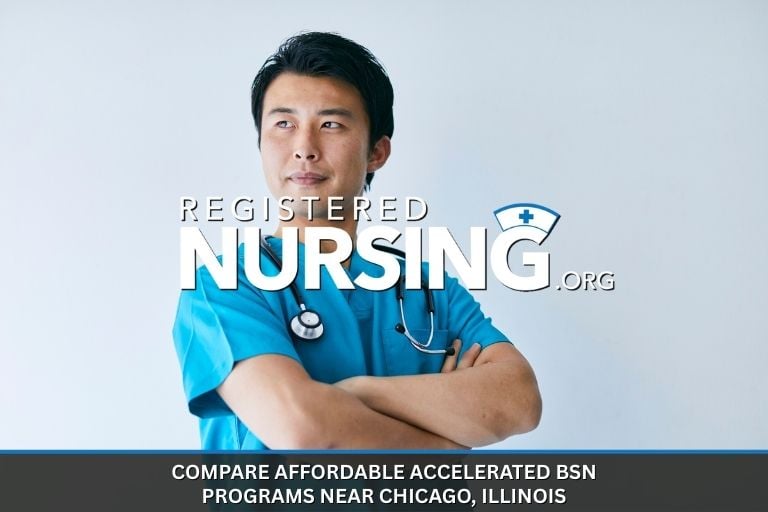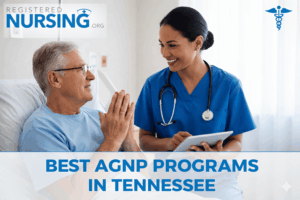Compare Affordable Accelerated BSN Programs Near Chicago, Illinois
- 2026 Affordable Accelerated BSN Programs Chicago, Illinois
- Chicago as a Center for Accelerated Nursing Education
- Structure and Timeline of Chicago ABSN Programs
- Admission Expectations in Chicago
- Cost of Tuition and Financial Aid in Chicago
- Clinical Training Across Chicago
- Regional and Population Health Considerations in Chicago
- Why It Matters for ABSN Students
- Employment Outlook for ABSN Graduates in Chicago
- Choosing the Best Accelerated BSN in Chicago
- Preparing for the Future of Nursing in Chicago
- Sources
- Latest Articles & Guides

Chicago is home to one of the largest healthcare systems in the Midwest, making it an ideal location for individuals ready to transition into nursing. Accelerated Bachelor of Science in Nursing (ABSN) programs offer a fast-track option for individuals with prior college experience or non-nursing degrees to enter the profession quickly. According to the Illinois Department of Employment Security, healthcare is one of the fastest-growing sectors in the state, with registered nursing consistently ranked as a high-demand occupation. For Chicago residents, this translates to accelerated programs that offer not only a degree but also access to extensive job opportunities throughout the metropolitan area.
The need for nurses in Illinois continues to expand as the population grows and healthcare demands become more complex. Chicago, with its diverse neighborhoods and extensive hospital systems, stands at the center of this demand. Affordable accelerated BSN programs allow motivated students to enter nursing with reduced time and financial barriers, helping meet workforce shortages while preparing graduates for meaningful careers in hospitals, clinics, and community health organizations throughout the city.
2026 Affordable Accelerated BSN Programs Chicago, Illinois
Saint Xavier University
Chicago, IL - Private 4-year - sxu.edu
Bachelor's - Accelerated BSN
Campus Based - Visit Website
Saint Xavier University's Accelerated BSN program in Chicago offers a 15-month, full-time curriculum for students with a prior bachelor's degree, focusing on health promotion, risk reduction, and illness management without a specific concentration. It integrates liberal arts and sciences, includes clinical rotations in top Chicago hospitals, and prepares graduates for the NCLEX-RN exam. With a total cost of $50,900, it may be affordable due to its accelerated nature reducing living expenses, small class sizes enhancing learning efficiency, and CCNE accreditation ensuring value. No entrance exam like ACT or SAT is required for this bachelor's-level program, as it is designed for degree holders.
- 15-month program length.
- Full-time, no breaks.
- 60 credit hours.
- On-campus format.
- Total cost $50,900.
- Starts May 2025.
- CCNE accredited.
- Small class sizes.
- Experienced faculty.
- Clinical rotations in Chicago.
Olivet Nazarene University
Bourbonnais, IL - Private 4-year - olivet.edu
Bachelor's - Accelerated Bachelor of Science in Nursing (ABSN)
Online & Campus Based - Visit Website
Olivet Nazarene University's Accelerated BSN program is a 16-month hybrid option combining online coursework with in-person clinical experiences. Designed for individuals with a prior degree, it does not require an ACT or SAT for admission, focusing instead on prerequisite completion. The curriculum emphasizes critical thinking and patient care skills, preparing students for the NCLEX-RN exam. At $785 per credit hour for 59 credits, the total cost is around $49,665, which includes lab and software fees, making it an affordable choice due to its efficient timeline and comprehensive fee structure. This program is ideal for career changers seeking a fast entry into nursing.
- 16-month program length
- Hybrid online and campus format
- $785 per credit hour
- 59 credit hours required
- Prepares for NCLEX exam
- Includes lab and software fees
- Focus on critical decision-making
- Hands-on clinical practice
- Designed for career changers
- Meets NCSBN requirements
Elmhurst University
Elmhurst, IL - Private 4-year - elmhurst.edu
Bachelor's - Accelerated Bachelor of Science in Nursing
Online Learning - Visit Website
Elmhurst University's online Accelerated BSN program is tailored for those with a prior bachelor's degree, enabling a swift 16-month path to RN licensure without a specific concentration. It requires a 3.0 GPA for admission and does not mandate an ACT or SAT exam, focusing on affordability through financial aid options and its CCNE accreditation, which may reduce costs. The curriculum blends online learning with clinical experiences and on-campus residencies, covering adult and family health, and emphasizes values like social justice, preparing students for the NCLEX-RN with over 450 clinical hours.
- 16-month program duration.
- CCNE-accredited.
- Online coursework with clinical placements.
- Two on-campus residencies.
- 3.0 GPA requirement.
- 60 credit hours.
- 450+ clinical hours.
- Prior bachelor's degree required.
- Prepares for NCLEX-RN exam.
- Financial aid available.
St. Augustine College
Chicago, IL - Private 4-year - staugustine.edu
Bachelor's - Accelerated Bachelor of Science in Nursing (BSN)
Online & Campus Based - Visit Website
St. Augustine College's Accelerated BSN program, offered in partnership with Lewis University, is a hybrid format that can be completed in as little as 18 months, making it an affordable option due to its efficient timeline and potential for reduced overall costs. It uniquely supports Spanish-speaking students with a transition to English, enhancing accessibility. Admission requires a 3.0 GPA, prerequisite courses, and an entrance exam, though the specific exam is not specified. The program features small class sizes, personalized attention, clinical placements in Chicago healthcare facilities, hands-on training, and simulation labs, preparing graduates for diverse nursing roles without a concentration focus.
- 18-month completion time.
- Hybrid program format.
- Option for Spanish to English transition.
- Small class sizes.
- Clinical placements in Chicago.
- 3.0 GPA admission requirement.
- Hands-on training included.
- Simulation labs available.
- Personalized attention.
- Diverse learning environment.
Lewis University
Romeoville, IL - Private 4-year - lewisu.edu
Bachelor's - Accelerated Bachelor of Science in Nursing (BSN)
Campus Based - Visit Website
Lewis University's Accelerated BSN program in Chicago, Illinois, offers a fast-track path for career changers with a prior bachelor's degree, featuring a 6-semester curriculum that includes hybrid and in-person courses with flexible full-time or part-time schedules, including daytime, evening, and weekend classes. Admission requires a 3.0 GPA and completion of prerequisite courses, but no ACT or SAT is needed as it's a bachelor's-level program. Accredited by CCNE, it emphasizes holistic patient care and includes clinical experience, preparing graduates for diverse nursing roles. Affordability may stem from its Roman Catholic affiliation, potential financial aid options, and military-friendly policies, though specific costs are not detailed.
- 6-semester program.
- Hybrid and in-person courses.
- Full-time or part-time options.
- Daytime, evening, weekend classes.
- 3.0 GPA requirement.
- Two pathways available.
- Holistic patient care focus.
- Accredited by CCNE.
- Clinical experience included.
- Diverse career opportunities.
Roosevelt University
Chicago, IL - Private 4-year - roosevelt.edu
Bachelor's - Accelerated Bachelor's in Nursing, BSN
Campus Based - Visit Website
Roosevelt University's Accelerated BSN program in Chicago offers a three-year path to a nursing degree, emphasizing direct entry for high school seniors without requiring ACT or SAT exams, making it accessible. It features clinical rotations at top local hospitals, a CCNE-accredited curriculum focused on critical thinking and compassionate care, and small cohort sizes for personalized learning. Affordability is supported by its public university status and potential financial aid options, preparing graduates for high-demand roles in Illinois healthcare systems.
- Three-year program duration
- Direct entry for high school seniors
- Clinicals at top Chicago hospitals
- Accredited by CCNE
- Focus on critical thinking and care
- Holistic admission process
- Strong high school prerequisites
- Prepares for NCLEX exam
- Small cohort sizes
- Diverse patient group exposure
Chicago as a Center for Accelerated Nursing Education
Chicago's healthcare environment provides a unique backdrop for accelerated BSN education. Students enrolled in local programs encounter a patient population that mirrors the cultural and socioeconomic diversity of the city. This broad exposure equips graduates with essential skills in cultural competence and community engagement, both of which are increasingly vital in nursing practice.
The city also benefits from its status as a hub for research and healthcare innovation. Accelerated students often participate in clinical rotations in large teaching hospitals and community health centers, building experience that enhances readiness for the NCLEX-RN exam and future employment. Data from the American Association of Colleges of Nursing highlights the importance of baccalaureate-prepared nurses in advancing patient outcomes, a factor that strengthens the case for ABSN education in Chicago.
Structure and Timeline of Chicago ABSN Programs
Accelerated BSN programs in Chicago are designed to condense a traditional four year curriculum into an intensive format. While nursing programs in Chicago vary, they generally include:
- Length of Study: Ranging from 12 to 18 months, depending on intensity and delivery style.
- Hybrid Formats: Coursework may be completed online, paired with in-person labs and clinical placements throughout Chicago.
- Focused Curriculum: Emphasis on advanced clinical skills, leadership, and patient safety to prepare graduates for licensure.
The pace of these programs requires a full-time commitment, but it allows students to transition into nursing careers far more quickly than traditional options.
Admission Expectations in Chicago
Admission requirements for Chicago ABSN programs are competitive and ensure that applicants are prepared for the demanding pace of study. Common criteria include:
- A bachelor's degree in a non-nursing field or a minimum number of transferable college credits
- Completion of prerequisites such as anatomy, physiology, microbiology, and statistics
- A GPA requirement, typically around 3.0
- English language proficiency for applicants whose first language is not English
Admissions teams often look for applicants with strong motivation and evidence of time management skills. Recommendation letters and personal statements highlighting commitment to nursing as a second career can strengthen an application. Guidance from the Illinois Board of Nursing can also help applicants ensure they are meeting state standards.
Cost of Tuition and Financial Aid in Chicago
Program cost is an important factor for ABSN students in Chicago. Tuition varies widely depending on program format and duration, but affordability remains central for those seeking to minimize debt. Options to offset costs include:
- Employer Tuition Assistance: Healthcare providers in Chicago sometimes reimburse tuition for employees transitioning into nursing.
- Federal and State Aid: FAFSA and Illinois grants are available for eligible students.
- Scholarships for Nursing Students: Awards from national and local organizations support individuals entering nursing as a second career.
When factoring in living expenses such as housing and transportation in Chicago, students are encouraged to develop a detailed financial plan. Comparing tuition against projected salaries helps ensure the return on investment remains strong. The Health Resources & Services Administration offers additional scholarship and loan repayment opportunities for nurses working in underserved areas.
Sample Cost and Timeline Overview
| Program Length | Estimated Tuition Range | Format |
| 12 Months | $25,000 – $40,000 | Hybrid/Intensive |
| 15 Months | $30,000 – $45,000 | Online + In-Person Labs |
| 18 Months | $35,000 – $50,000 | Traditional Classroom + Clinical |
These figures represent typical ranges for Chicago-area programs, but actual costs vary by institution.
Clinical Training Across Chicago
Clinical experience is a core component of ABSN education, and Chicago offers diverse opportunities for practical training. Students may rotate through:
- Large Urban Hospitals: Northwestern Memorial Hospital, Rush University Medical Center, University of Chicago Medicine
- Community Health Centers: Erie Family Health Centers, Howard Brown Health, Lawndale Christian Health Center
- Specialty Clinics: Ann & Robert H. Lurie Children's Hospital (pediatrics), Shirley Ryan AbilityLab (rehabilitation), Jesse Brown VA Medical Center (veteran health care)
This variety of placements prepares graduates to adapt to different care settings and enhances employability after program completion.
Regional and Population Health Considerations in Chicago
Chicago's neighborhoods vary widely in terms of demographics, socioeconomic status, health outcomes, and access to care, making the city an ideal training ground for aspiring nurses committed to addressing health disparities and serving diverse communities.
North Side
Generally more affluent and home to a higher concentration of privately insured patients, the North Side (including areas like Lakeview, Lincoln Park, and Andersonville) offers opportunities to work in outpatient clinics, women's health centers, and specialty practices. Students may encounter more preventive care and chronic disease management among aging but health-literate populations.
South Side
Chicago's South Side is rich in cultural heritage but often faces systemic challenges related to healthcare access, maternal outcomes, and chronic illness prevalence. Neighborhoods like Englewood, Woodlawn, and Roseland are frequently the focus of public health initiatives, making this region especially valuable for students interested in community health, social determinants of health, and trauma-informed care.
West Side
Health inequities, including higher rates of diabetes, asthma, and mental health crises heavily impact areas like North Lawndale, Austin, and Humboldt Park. Clinical placements in this region allow students to engage with harm reduction strategies, violence prevention programs, and school-based health services, often in collaboration with community organizers and nonprofit partners.
Downtown & Near West Side
The Illinois Medical District and surrounding areas house some of the city’s most advanced medical facilities, drawing a broad mix of patients—from unhoused individuals to international visitors. Clinical rotations here may involve high-acuity hospital care, emergency nursing, or tertiary specialty services.
Suburban Communities
In suburban areas such as Oak Park, Skokie, Evanston, and Naperville, students may encounter patients navigating long-term recovery, post-acute care, or behavioral health in lower intensity settings. While these populations may have more consistent access to care, disparities still exist among immigrant and elderly groups in suburban regions.
Why It Matters for ABSN Students
Understanding Chicago's regional population dynamics helps ABSN students become not only skilled clinicians, but also culturally competent and socially responsive nurses. This awareness fosters better communication, care coordination, and ethical decision-making across different care environments. Many students report that rotating across multiple neighborhoods deepens their understanding of health equity, enhances their adaptability, and informs their future career paths, whether in acute care, public health, or community-based nursing.
Employment Outlook for ABSN Graduates in Chicago
Graduates of accelerated BSN programs in Chicago step into a labor market with strong demand. According to the Bureau of Labor Statistics, registered nurses in Illinois earn salaries above the national average, with the Chicago metropolitan region consistently among the highest paying markets.
Career pathways for ABSN graduates often include:
- Hospital Staff Nurse: Providing direct care in medical-surgical units, emergency rooms, or intensive care
- Public Health Nurse: Supporting initiatives that improve access and outcomes in diverse communities
- School and Community Nurse: Delivering wellness programs in Chicago Public Schools and local organizations
- Specialty Nurse: Transitioning into roles in cardiology, obstetrics, or oncology for specialized care
These career outcomes illustrate the breadth of opportunity available to nurses in Chicago after completing an accelerated program.
Choosing the Best Accelerated BSN in Chicago
Selecting a program involves evaluating multiple factors to ensure the right fit. Prospective students should consider:
- Program Intensity and Length: Matching workload to personal and family commitments
- Accreditation and NCLEX Readiness: Confirming the program meets professional standards and licensure requirements
- Clinical Partnerships: Reviewing where students complete rotations and how these align with career interests
Taking time to align program structure with long-term goals helps ensure both affordability and strong preparation for a nursing career.
Preparing for the Future of Nursing in Chicago
Affordable accelerated BSN programs in Chicago provide more than academic credentials. They represent a strategic response to workforce needs and a direct pathway for motivated individuals to enter a growing profession. Graduates leave nursing schools in Illinois ready to contribute to patient safety, public health, and community wellness across the city.
As Chicago faces challenges such as an aging population and disparities in healthcare access, ABSN graduates will play a central role in strengthening the local healthcare system. Completing an accelerated program offers not only immediate employment opportunities but also a foundation for future advancement into graduate study, leadership, or specialized practice. For individuals seeking to change careers and make an impact, Chicago's affordable ABSN programs provide a clear and rewarding path forward.
Sources
- Bureau of Labor Statistics: Registered Nurses
- Illinois Department of Employment Security
- American Association of Colleges of Nursing
- Illinois Board of Nursing
- Health Resources & Services Administration
Latest Articles & Guides
One of the keys to success as a registered nurse is embracing lifelong learning. Our articles and guides address hot topics and current events in nursing, from education to career mobility and beyond. No matter where you are on your nursing journey, there’s an article to help you build your knowledge base.
Browse our latest articles, curated specifically for modern nurses.



